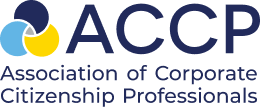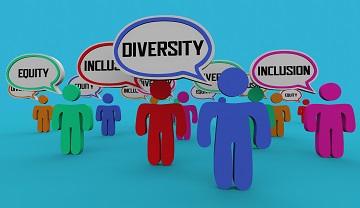ACCP Staff
ACCP President and CEO Carolyn Berkowitz recently presented to a group of internal CSR stakeholders across Comcast NBCUniversal on “The State of Corporate Social Responsibility (CSR) & Key Trends.”
In part one of ACCP’s blog series, we shared excerpts from Carolyn’s discussion with Dan Kamins, Comcast’s Senior Director of Strategic Partnerships, highlighting Carolyn’s career and what corporate social impact professionals can do to make a difference. In part two of this blog series, we’ll look at Carolyn’s thoughts on the importance of centering corporate grantmaking efforts on racial equity and why language matters.
Racial and economic inequities existed long before 2020, but COVID and the public outcry after George Floyd’s murder centered the conversation of addressing the systemic inequities and overt and implicit biases on a national scale. What is the role of corporations in this conversation, and what levers can they use both internally and externally to actively address these inequities?
That’s a big and important question. Corporate social impact alone is not going to meaningfully address racial inequity. Nor is a company’s external community work the most significant strategy to change the trajectory of historical and ongoing systemic inequities. BUT – and this is important – community engagement is arguably the most visible work a corporation will do in addressing injustice. And because the response can be immediate, it puts the company on record as addressing the issue. It is an essential first step and, when sustained, demonstrates the company’s commitment.
Going deeper, corporations have a responsibility to understand the historic damage their systems have created and correct their ways going forward. The company and its leadership must understand and acknowledge their historical intersections with other systems that have disadvantaged Black and Brown people throughout history. Only then can companies take meaningful action. This is not short-term work – it doesn’t align with Wall Street’s measure of quarterly performance. Real change will take hold by listening and learning, demonstrating bravery in the face of naysayers, committing to the long-term, and believing that we, as companies and as a society, can and must be better.
Your departments are the hub of this work at Comcast NBCUniversal. The fact that DEI and CSR are aligned under one impact and inclusion team leader is very forward-thinking, as is creating a Community of Practice for community-facing roles across the businesses. You already have structures – formal and informal- in place to support faster, more effective impact.
What role can CSR professionals play in advancing the conversation? How can we support our company’s commitment to change, and what should we do as stewards of the company’s relationship with communities to drive impact?
As for CSR, there are ways that each of you can actively support change through your roles.
Earlier this year, ACCP completed its “Advancing Equity in the Corporate Social Impact Profession” research, the first-of-its-kind disaggregated look at the demographics of the profession and the experiences and perspectives of CSR professionals around recruitment practices, advancement opportunities, and more.
HOW you do your work is critical to achieving more just outcomes, specifically by implementing funding and volunteerism practices centered in equity. Our research shows that 80+% of CSR professionals do not feel prepared to execute equitable practices effectively.
Here’s what we believe EVERY grantmaker must be able to do:
- Identify organizations led by people of color
- Understand the equity gaps that exist in your current areas of focus (only 13% feel very prepared)
- Identify organizations that focus on addressing systemic inequities (in any focus area)
- Judge the performance of organizations in your portfolio in addressing equity gaps (only 4% feel very prepared)
- Engage community voices and listen to different perspectives to identify possible solutions
- Measure outcomes and impact in an equitable way.
We must become students of these practices – learning from experts and one another. Commit to skilling up and adopting these principles as you continue to select grantees and work with internal business partners and employee volunteers.
What three takeaways from this conversation would you like us to remember?
I’d challenge everyone in the field to keep these three fundamental truths in mind as you advance your corporate responsibility work:
1) Connect to the Business
2) Pursue Racial Equity
3) Language Matters.
We talked previously about connecting to the business and the fundamental necessity of racial equity in our work, but here’s a word about the importance of language.
- We are at the intersection of business and community, two groups of people who don’t speak the same language. Be bilingual to confidently communicate in “business speak” when seeking to influence internally and in “community speak” when working with grantees and partners to understand your company’s purpose and strategy. Be ready to translate for your different audiences to achieve your goals.
- Know the meaning of Purpose, ESG, CSR, and DEI, and understand their nuances. Each acronym represents a different discipline but is related in a Venn diagram. Your work likely touches them all, but your focus is on one more than another. Know what they mean and how they differ, and use the terms correctly to credibly demonstrate how your work fits in.
- Learn and incorporate new and inclusive language as it emerges about race and gender, equity, equality, belonging, etc. People listen when you use inclusive language and tune out when you don’t.
Effectively communicating our work is a challenge for every company. Consciously adapting your messages with nuanced language will sharpen your focus, generate support, build rapport, and trust, and further connect you with your internal and external stakeholders.
For more information about ACCP, please visit our website.

